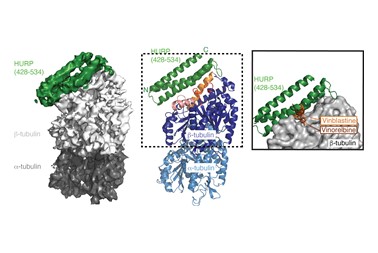Date: 2024-10-23
Vinca alkaloids, a class of tubulin-binding agent, are widely used in treating cancer, yet the emerging resistance compromises their efficacy. Hepatoma up-regulated protein (HURP), a microtubule-associated protein displaying heighted expression across various cancer types, reduces cancer cells’ sensitivity to vinca-alkaloid drugs upon overexpression. However, the molecular basis behind this drug resistance remains unknown. An international research team led by Dr. Kuo-Chiang Hsia at the Institute of Molecular Biology, Academia Sinica, Dr. Su-Yi Tsai (Department of Life Science, National Taiwan University) and Dr. Yuta Shimamoto (National Institute of Genetics) discover a tubulin-binding domain within HURP, and establish its role in regulating microtubule growth. Cryo-EM analysis reveals interactions between HURP's tubulin-binding domain and the vinca domain on β-tubulin-the site targeted by vinca alkaloid drugs. Importantly, HURP competes directly with the vinorelbine, a vinca alkaloid-based chemotherapeutic agent, countering microtubule growth defects caused by vinorelbine both in vitro and in vivo. The research findings elucidate a mechanism driving drug resistance in HURP-overexpressing cancer cells and emphasize HURP tubulin-binding domain’s role in mitotic spindle assembly. This underscores its potential as a therapeutic target to improve cancer treatment. This research has been published on October 14, 2024 in Nature Communications.
-
Link









 Home
Home

